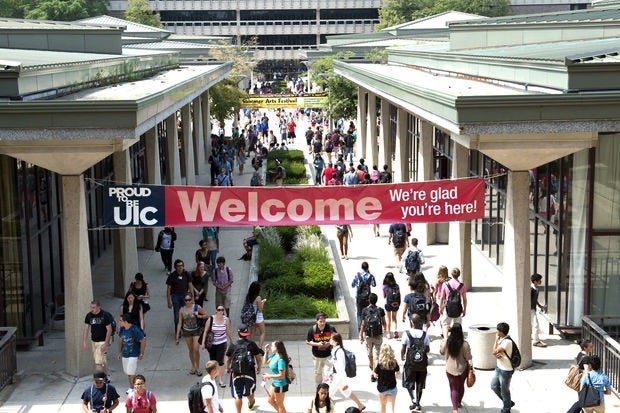The Non-Traditional Route to College
Title Heading link

According to the University of Illinois Chicago’s Office of Diversity, Equity and Engagement, our school population is incredibly diverse, with over 62% of the student body being minorities. However, only 8.6% of these students are non-traditional, which is defined by the university as being 25 years and up. UIC junior Jesus Garcia is one such student.
Before attending UIC full-time, Garcia attended UIC College Prep for high school. Initially, he did not want to go straight to college after graduation. He wanted to join the Marines.
“At that time, I was strongly considering leaving high school and going to work with my dad in his carpentry shop and attain a GED later,” Garcia said. “I wanted to join the Marines at 18 after getting my GED. However, my parents were able to convince me that I would be better off completing high school first and then deciding what to do. So that is what I did.”
However, things didn’t go as smoothly as he hoped. All throughout his school career, he was an outcast and picked on by his peers. During his junior year, he suffered through an abusive relationship with a girlfriend; yet he found the strength to leave a year and a half later. Things at home weren’t great, either — his parents fought and his dad was a drinker.
“So growing up, because of the difficult relationship between my mom and dad, I was told I was ‘their last chance for something good or right,’ that I had to be the child they deserved,” Garcia said.
He hoped that if he was the perfect child, his parents would stay together. But at the start of his senior year, his parents announced they would soon be getting a divorce. Because of this, he latched onto an escape: sports. Specifically, basketball and football, which became his newfound passion. The field was a place to release his stresses, somewhere he could go to before and after school.
Unfortunately, an injury his senior year brought that to a halt. Even though he was once an honors and AP student, he withdrew from these classes and began taking regular classes instead.
“I stopped caring and no longer had the drive to try,” Garcia said, describing the person he became as a “tainted” version of himself.
Now that he was injured, joining the Marines was out of the question. After graduating from UIC College Prep in 2012, he went to University of Illinois – Urbana-Champaign. However, he spent a lot of time his freshman year drinking and subsequently ended his first semester with two F’s, one D, and one C-.
“The C- was in a writing course,” says Garcia. “My professor told me at the end of the semester that had I done everything on time, I would have easily achieved an A+ in his class.”
He began the next semester at UIUC on academic probation, but was shortly kicked out of the university due to his poor grades. He spent the next two semesters at different community colleges, but didn’t see much improvement. So, after Fall of 2013, he decided to take a break from school and work for a year, after which he re-enrolled in Harold Washington community college and achieved an Associates in Arts in 2016. From there, he joined the Marines while working part-time at Panda Express.
Around February 2020, Garcia decided not to continue with the Marines and returned to school. He then studied computer science at Berkeley City College in California, but at the onset of the COVID-19 pandemic, his living situation became compromised. He had been planning to live with his elderly aunt and uncle, but they no longer felt comfortable having Garcia live with them due to concerns of catching the virus. He moved back in with his family in Chicago and completed the year virtually. In Fall 2020, he transferred to UIC and began studying kinesiology and physical therapy.
“I spent a long time away from school, and my return to school was right when everything went online,” Garcia said. “It was extremely simple and way too easy — it did not help me prepare for the fast pace classes of UIC.” But he positively reflects on his new situation — he lives at home rent-free, and the government pays for his college tuition, even sending him a check each month for living expenses.
Now, as a UIC student he says he has new goals he wants to achieve.
“I would like to structure a course for high school students that will help them learn how to workout and how to strengthen their bodies for their specific goals, weight loss, gain muscle mass, run faster, tackle harder, run further, whatever it is. I also want to open my own gym that provides physical therapy and personal training, and my ‘gym members’ would be other personal trainers and they would use my gym as their own space to train their clients.”